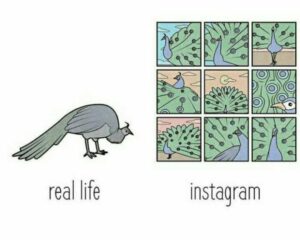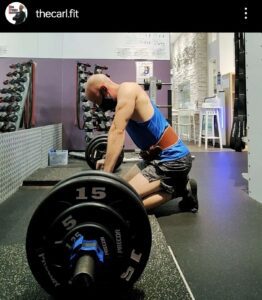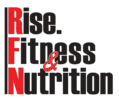Comparing yourself with others seems like a universal hobby, right up there with binge-watching TV shows and contemplating the mysteries of the universe.
She/he looks better than me, better butt, curves, a six pack, bigger arms…. Sounds like a familiar voice in the back of your head?
It’s a game we all play, whether we admit it or not. But hey, let’s talk about it a bit more, you’ll be surprised by how silly this game is.
Embracing Dissatisfaction as Fuel?
While comparing yourself with others can bring dissatisfaction, that can turn into a catalyst for self-improvement, it’s just crucial to separate between motivation and self-deprecation.
Striving for a better version of yourself is admirable, but it’s vital that you avoid falling into the abyss of perpetual-negative self-talk.
Where is the line?
As zen as it sounds the line is inside of you driven from to the standards that are forced in your mind that try to take control of the driving wheel and decide your direction.

Nope, Instagram or TikTok don't help (duh)
Let’s have a look into your Instagram feed for a moment… Among the myriad of posts, beside friends and family there are influencers. Have you ever paused to consider why you actually follow them?
Is it for their engaging content or is it for the allure of their extremely curated lifestyles? While it’s common to be drawn to individuals who showcase picturesque travel destinations or maintain seemingly flawless appearances, the real question is: how does consuming these polished images make you feel?
Do they serve as inspiration for your own aspirations, or do they inadvertently increase feelings of inadequacy as you comparing yourself and your reality to their insanely curated, edited and scripted highlight reels?

Social media and the quest to find a balance
Using social media is like walking on a tightrope. We all know that what people post online is often carefully chosen with the perfect lighting, angles, and filters. But when you compare those pictures to your own real life, it can make you feel a bit… down.
As you scroll through these polished posts, do you ever start comparing them to your own experiences—the good, the bad, and everything in between?
Here’s the thing: how does this comparison affect how you feel about your own body? Does it make you feel good or not-so-great?
Think about it: it’s very easy to point out five things you don’t like about yourself, but finding five things you do like can be a bit trickier.
Don’t believe me? Give it a try and, if you want, you can let me know what you come up with!

A real story: mine
Let me share a bit about myself. It’s 2024, and I’m 36 years young (lol) about 73kg and 172cm tall.
Oh, and I’m bald. My hair loss journey began during the last year of high school, around 2005-2006, and by the summer of 2015, I decided it was time to let my hair go and to embrace my baldness.

Hair loss is a common occurrence in men, often determined by genetics that is way beyond our control. It’s a gradual painful process, watching those locks diminish day by day, while it looks like everyone else still rocks trendy hairstyles with confidence.
This experience can be particularly challenging when you’re already an adult; now, imagine navigating it as a teenager or in your twenties, not cool uh?
As mentioned earlier, I’m around 172cm tall, falling into that middle ground—not towering, yet not exactly short either. In my twenties, I weighed around 64kg, and amidst peers who appeared taller, sported stylish haircuts, boasted muscular builds, and exuded confidence, I struggled with self-assurance.
I embarked on a fitness journey without a clear direction, resulting in some progress but also a fair share of injuries along the way. Despite my efforts, negative feedback persisted, fueling my self-doubt.
Eventually, I resigned myself to accepting it as background noise in my thoughts, believing it was the only way to cope.
Fast forward to today, and I’m still standing at 170cm (duh). I’m bald and proud and strive daily to become the best version of myself, prioritizing strength and health.
Despite the persistent negative feedback from comparisons, attempting to undermine my progress, I’ve discovered a more effective way to deal with it.
I’m eager to share this approach with you, hopeful that it might help you as well.
Screw perfection. It's nonsense
Let me start off by telling you that I hate the cliché “you’re perfect as you are.” To me, it feels uninspiring, suggesting there’s no reason to strive for self-improvement since you’re supposedly already flawless.

I don’t believe in perfection, but I firmly believe in gradual and consistent self-improvement.
I’m confident that you possess unique qualities that serve as the foundation for your growth. Rather than allowing them to weigh you down, leverage them to become the better versions of yourself.
A better way to deal with comparing yourself?
So, what’s my antidote to self-loathing? It’s simple: reframing comparisons for what they truly are—often pointless and unproductive.
Consider this: can you compare an apple to a table? It doesn’t quite add up, does it? Similarly, comparing ourselves to strangers on the train or metro may seem reasonable, but does it hold any real meaning?

You could spend all day scrutinizing your flaws by comparing yourself to a bodybuilder, a model, or anyone in terms of height, weight, shape, wealth and whatnot. But would it make any sense? Absolutely not. Why?
Because you’re an apple, and they’re an table.
The truth is, every time you are comparing yourself to someone else—whether they appear more attractive or in better shape—you’re essentially comparing apples to oranges.
You are evaluating two entirely different entities with little in common aside from the fact that you’re both humans.
Moreover, these comparisons often points at aspects of yourself you can’t control against those you can.
In my case, I can’t control my height or baldness but I 100% can control my consistency with nutrition and training. That’s where meaningful comparisons lie—with your own progress and goals and your old self.
Simply said, comparing yourself to others is a futile exercise. Instead, focus on your own journey, strive for improvement where it matters most—within yourself. That’s the only comparison that truly counts.
The rest is just there to waste your precious time and energy
Let me make it clear
The only comparison that truly matters is the one between you and your unique personal journey. Trying to measure up against someone else simply doesn’t make sense. You have no insight into their path, their aspirations, or their feelings. And let’s face it, you can’t control what’s happening in their world so why even bother.

Also if anyone starts comparing yourself to anyone else, feel free to suggest them to gently go F-their-selves and focus on their own journey instead.
Fear of comparing yourself at the gym?
If you’re hitting the gym for strength training and weightlifting, here’s a fantastic strategy to put comparisons into perspective.
Recently, I was chatting with a friend of mine—a towering guy standing 190cm (6.2 feet) tall and around 90kg (close to 200lbs).
I excitedly shared that my deadlift had reached 60kg (130lbs ish), a milestone that left me feeling pretty strong.
His response? A chuckle, dismissing my achievement as merely a warm-up weight for him.
Ever had a similar experience?

It’s moments like these that highlight the absurdity of comparing yourself to others, especially in the gym.
I’ll tell you why.
Comparing yourself using simple math
Here’s how I immediately got a clearer perspective on these useless comparisons:
I calculated the ratio between the weight I lift and my body weight.
Here’s how to do it: take my 60kg deadlift. At that time, I weighed around 69kg.
I calculated the ratio: 60 divided by 69, resulting in 0.86 or 86% of my body weight that I could lift at my best.

I applied this method to my friend, who could lift 77kg, that equated to 111% of my body weight. Quite a difference, right?
I was able to understand where I stood in relation to my own current level
Do you see where I’m going with this? The next time you’re engaged in such meaningless chatter about who lifts heavier, don’t focus solely on kilograms (or pounds). Instead, consider the lift-to-body-weight ratio for a more meaningful perspective.
Remember, your very own unique path is the only thing you want to be comparing yourself with.
Have an amazing day and never forget: you got this! If you have any question just leave a comment below or reach me on instagram!
If you’re curious to calculate your daily calories goal check out my Free calories calculator:
I made a podcast about this too, you can listen to it wherever you listen to your podcasts or you can listen to it just by playing the youtube video below

The only comparison you can make is against you yourself, control things that you can control, you are the only thing in the universe can 100% control by you! #pastyouvsfutureyou
Love this article!
Thank you so much!